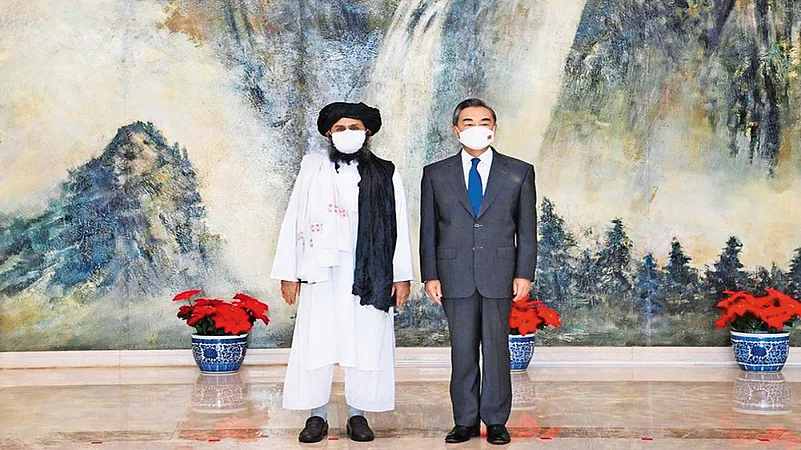As the United States nears the completion of its withdrawal from Afghanistan, it’s tempting to view the departure through the lens of great power rivalry: Beijing will fill the vacuum left by America’s exit, step up its influence in Afghanistan, and join forces with regional partners Pakistan, Russia, and Iran to make a major imprint on a post-America Afghanistan. In reality, it’s not nearly as simple as that. America’s departure does provide a strategic opportunity for Beijing and other US rivals. But capitalising on this opportunity will be no cake walk.
It’s folly to assume China will simply waltz into Afghanistan, post-US withdrawal, and start building influence. Beijing has a cordial relationship with Kabul, and it has developed strong contacts with the Taliban. But China’s physical presence in Afghanistan is modest. Beijing is known for investing in volatile spaces, from Pakistan to sub-Saharan Africa, but it isn’t a major economic player in Afghanistan. Because of the war, it has held back from bringing in its Belt and Road Initiative. If it was hesitant to deploy capital before the US withdrawal, it will be even more anxious post-withdrawal, when violence and conflict will intensify.
Beijing worries about the Taliban juggernaut, but even more about terrorism threats like ISIS and the Turkestan Islamic Party (TIP)—a group comprised mainly of Uighur militants. The latter has been more active in Syria, and Beijing likely exaggerates the TIP threat to justify its abhorrent treatment of Uighurs in Xinjiang. But China worries about the TIP presence across its western border. And these terror groups will only get stronger after the US withdrawal. Increasing violence, more lawless spaces, and an ever-weakening writ of the state will provide them with a fertile environment to carve out strongholds and sanctuaries.
In effect, the US withdrawal complicates China’s two core interests in Afghanistan: Establishing a more conducive environment for investment, and reducing terrorism threats. This is why Beijing likely harbours ambivalence about the US withdrawal: America’s exit is a strategic opportunity, but also a blow to China’s interests. Tehran, Moscow, and Islamabad likely feel the same way: The withdrawal will generate spillover effects—refugee flows, a more robust drug trade, heightened terrorism threats—that concern them all.
This leaves Beijing the option of taking matters into its own hands to pursue its two core interests. This won’t be easy, but China does have two advantages: Strong contacts with the Taliban, and a deep alliance with the Taliban’s Pakistani ally. Expect Beijing, with possible facilitation from Islamabad, to try to negotiate a two-pronged understanding with the insurgents—one that results in the Taliban agreeing to deny space to TIP, and to endorse Chinese infrastructure projects in Taliban-controlled areas.

The first request appears to have already been made, in late July, when Beijing hosted—and not for the first time—a senior Taliban delegation. The second ask shouldn’t theoretically be too hard of a sell. The Taliban has stated that it supports foreign-sponsored infrastructure projects that serve national development goals. It has even endorsed the Turkmenistan-Afghanistan-Pakistan-India gas pipeline, which is currently under construction. If the Taliban is willing to support and protect a US-backed pipeline project with Indian participation, one would expect it to be amenable to Chinese infrastructure initiatives.
Still, getting the Taliban to say ‘yes’ won’t be easy. TIP isn’t as important to the Taliban as is Al-Qaeda, the Taliban’s longstanding partner. But the Taliban doesn’t exactly have a strong track record of denying space to fellow militant groups—other than ISIS, a bitter rival. Additionally, despite rhetoric expressing support for infrastructure—and Taliban public rhetoric should always be taken with many grains of salt—the Taliban has exhibited violent disrespect toward it. In recent years, it has blown up power pylons conveying electricity from neighboring Iran and Uzbekistan, among other electricity structures. In effect, it won’t be easy for China to capitalise on America’s withdrawal from Afghanistan.
The Biden administration has demonstrated a willingness to decouple its deep tensions with China—and Russia—from its regional diplomacy on Afghanistan. Consider the ‘Troika Plus’, an Afghanistan-focused grouping of America, China, Pakistan and Russia that has met several times, including a planned meeting in August. This may make China hawks blanch, but Washington appears perfectly comfortable emphasising cooperation, not competition, with Beijing in Afghanistan.
Even while taking a hard line on Beijing, the Biden administration has expressed a willingness to work with China where interests align. One can’t rule out Washington working with Beijing to discuss how to address common concerns in Afghanistan, especially terrorism.
Still, this isn’t to underplay the strategic blow that Washington will inevitably suffer in the region post-withdrawal. Beijing may struggle to increase its influence in Afghanistan, but it will still be present in the broader neighbourhood. Washington, aside from continued financial assistance to the Afghan state and a residual force of 650 troops to protect diplomats, will be gone. In recent years, China has used infrastructure investments to make deep imprints across South and Central Asia—buoyed by growing partnerships with Russia and Pakistan, and undeterred by rival India. There’s little the US can do about this.
Washington has struggled to compete with China in East Asia, where America has a security presence and close defense allies. It has no such advantages in South and Central Asia. Its challenges there were apparent even years ago, when it had thousands of troops in Afghanistan. In 2015, I hosted a talk at the Wilson Center by a US official on Washington’s plans to develop connectivity projects in South and Central Asia. At one point, a Central Asian diplomat stood up and complained that the US simply isn’t present enough in the region.
The Biden administration has plans to counter China. It will use tools bequeathed to it by the Trump administration—the Indo Pacific strategy, the Development Finance Corporation, and Blue Dot Network, all meant to support investments that are more transparent and equitable than China’s—as well as new ones, such as the G-7’s ‘Build Back Better World’ global infrastructure investment. Washington hopes to assemble a large coalition of like-minded states to participate in such activities.
However, these are new, unproven initiatives. They can’t hold a candle to the $2 trillion in Chinese global investments since 2005, or to the $47 billion in BRI investments in 2020 alone—which actually represents, thanks to the pandemic, the lowest annual figure since BRI’s launch in 2013.
The silver lining for Washington? China has the strategic upper hand in South and Central Asia, but it won’t easily be able to leverage this advantage in Afghanistan. A new Great Game is brewing, but victory won’t come easy for Beijing.
(This appeared in the print edition as "Great Wall To Leap Over")
(Michael Kugelman is deputy director, Asia Program, at the Wilson Center, Washington DC. Views are personal.)
























